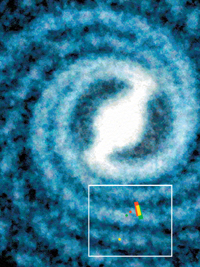|  Citations Citations
A different classical
tradition
Ancient Athens, often considered Western civilization’s ideal,
had an ugly side: repressing women. But James
Redfield, AB’54, PhD’61, the Edward Olson distinguished
service professor in Classical Languages & Literature, notes
that not all ancient Greeks shared this Athenian practice. In his
new book, The Locrian Maidens: Love and Death in Greek Italy
(Princeton University Press), Redfield points out that the Locrians,
inhabitants of a Greek colony in Italy, gave women special religious
rights that men could gain only through marriage.

Courtesy Richard Powell
and Richard Rees |
| The
box shows where a star cluster is formed. |
|
A star cluster is born
Astronomy & astrophysics professor Kyle
Cudworth and his former student, Richard Rees, SM’88,
PhD’95, now at Westfield State College, have provided the
first observational evidence that globular clusters—groups
of stars—can propagate. Cudworth and Rees, who presented their
findings at a January 5 American Astronomical Society meeting, analyzed
more than a century’s worth of astronomical data to show that
an older cluster, NGC 6397, passed through the Milky Way 5 million
years ago, leaving a new one, NGC 6231, in its wake.
Bacteria be gone
Keeping harmful bacteria at bay remains critical to preventing postoperative
infection. Chicago researchers, led by associate professor of surgery
John Alverdy, report in the
February Gastroenterology that pacifying bacteria, rather
than relying on antibiotics to kill them, safeguarded mice against
lethal germs. After surgery the mice were exposed to Pseudomonas
aeruginosa, an opportunistic pathogen; only mice who also received
a high molecular weight polymer, which acts as a protective coating,
survived. The coating prevents stress signals from reaching Pseudomonas
and prompting it to attack.
Egalitarian bliss
Marriage works best when couples avoid traditional gender roles
and fully share property, maintain Law School assistant professor
Carolyn Frantz and a Tel Aviv
University colleague in “Properties of Marriage,” a
January Columbia Law Review article. The ideal marriage,
they argue, is an “egalitarian liberal community” with
total autonomy for both partners, including freedom to exit the
relationship. Frantz also emphasizes the ongoing connection between
law and marriage, noting that people want their “government’s
legal stamp.”
The evolution of SARS
Scientists in China and at Chicago have traced Severe Acute Respiratory
Syndrome’s (SARS) evolution from its origins as an animal
virus to its current form in human hosts, reporting their findings
in Science Express, the online edition of Science.
Study coauthor Chung-I Wu,
professor and chair of Ecology & Evolution, analyzed genetic
changes in SARS that let the illness spread from person to person,
increasing infection rates. Last year SARS killed 774 people.
IQ isn’t everything
Persistence, dependability, and other noncognitive
skills likely have as large a stake in work and school achievement
as do more easily measured cognitive abilities. That’s according
to James Heckman,
the Henry Schultz distinguished service professor in Economics.
In his forthcoming book with Alan Kruger, Inequality in America:
What Role for Human Capital Policies? (MIT Press), Heckman
argues that high IQs don’t always predict socioeconomic success.
Employers and teachers, he found, most value dependability and consistency
in staff or students.—P.M.
|
|
